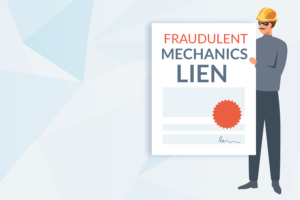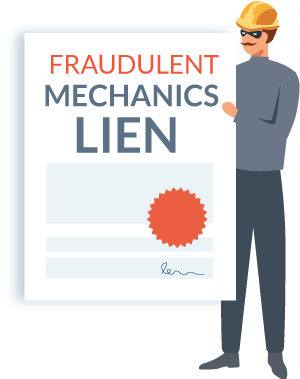
It’s no secret that mechanics liens are powerful tools that provide a “last-line-of-defense” protection against nonpayment on construction projects. It’s also no secret that property owners want to avoid liens at all costs and keep their property unencumbered. (Direct/general contractors can be on either side of the fence, since they can both file a lien to promote payment or be required to defend against a lien filed by a lower-tiered party as the claimant.)
Just like any powerful tool, however, mechanics liens can be abused. The ability of a mechanics lien to throw a wrench into the works and prompt payment can look like a magic bullet to financially distressed construction companies who believe that they have limited options, even if these companies may have failed to comply with the 
Furthermore, unscrupulous parties who want to get more than their proper share, who want to cause problems for a particular project, or who are just looking to make a fraudulent grab for cash sometimes file liens for these underhanded purposes. This is not a good idea. Knowingly filing an incorrect and improper mechanics lien just to further selfish or fraudulent purposes is problematic in several ways.
Mechanics liens, at their core, are a tool to promote fairness by protecting smaller, weaker parties from being out-leveraged by larger, stronger parties that are operating from a more advantageous position.
Extra Reading: Frivolous Liens – Intentionally Fraudulent vs. Honest Mistakes | Levelset
When unscrupulous parties subvert the lien rights process in the hopes of collecting unearned gains, their actions are ultimately disadvantageous to all lien claimants, because the more often that fraudulent liens are filed, the easier it becomes to assume that stricter timing and notice requirements are necessary to protect innocent property owners. Not only that, but fraudulent or otherwise improper liens can create problems outweighing benefits hoped for by the claimant.
Just like Uncle Ben Parker told Spiderman, “With great power comes great responsibility.”
What Is a Fraudulent Lien?

- Filing a lien against a property at which the lien claimant performed no work
- Inflating or fabricating the lien claim amount
- “Double-Dipping,” or filing a lien after the lien claimant was already fully paid
No matter the (improper) reason for such a filing, liens like these examples above are never justified. Common reasons that may prompt a lien filing of this sort are: that the claimant is owed money from the same GC or property owner but on a different project, but didn’t file a lien on that project before time expired; personal reasons generally related to the identity of the property owner; or just a general fraud/shake-down.
Since some unsophisticated property owners can be “scared” by a mechanics lien and potentially coerced into payment without significant review, mechanics liens can be a ripe target for fraudulent “contractors” attempting to take advantage of vulnerable property owners.
Natural Disasters Bring Out the Best and the Worst
Unfortunately, property owners become “vulnerable” when they find themselves in a desperate situation due to circumstances beyond their control, such as a natural disaster. Disasters lead to a lot of construction jobs, and with those jobs come the possibility of shady contractors looking to take advantage of the victims’ desperation to make (really, to steal) a quick buck. It’s unfortunate, but the scenario plays out with disappointing frequency.
In one large public case, a Louisiana contractor charged with multiple fraudulent acts filed a large amount of liens claimed to be improper by homeowners after the 2016 flooding in Baton Rouge. While embroiled in legal controversies, both civil and criminal, that contractor chose to release the liens at issue. While the actions of a very few people shine a poor light on the vast majority of contractors, such actions have led to stronger restrictions on mechanics liens in the past which only makes it more difficult for honest companies to manage their lien rights.
What Could Happen If An Improper Lien Is Filed?
The short answer here is: a lot. And, for the fraudulent lien claimant, none of it is good.
While some mechanics lien statutes clearly set forth particular consequences for filing and/or failing to release a fraudulent or improper lien, in other circumstances the remedy must be found through examination of alternate parts of a state’s law. Sometimes, the consequences can even be criminal in nature.
New York state law provides examples of each of these potential outcomes. While it may be difficult to prove a lien is exaggerated in New York, if a lien is exaggerated under the definition in Lien Law § 39, the lien will be declared void, and “damages may be awarded to the owner or contractor that can include (i) the costs of any bond; (ii) attorney fees; and (iii) “an amount equal to the difference by which the amount claimed to be due or to become due as stated in the notice of lien exceed the amount actually due or to become due thereon.”
If this is not bad enough, filing a fraudulent mechanics lien can also one up to potential criminal prosecution. In U.S. ex. rel Roberts v. Ternullo, falsely filing a mechanics lien — in this example, many mechanics liens — led to criminal charges and even jail time for the perpetrator.
In the Ternullo case, the owner/operator of a retail fence business “would frequently fail to deliver fencing contracted for by customers or deliver less than called for in the contract, and when full payment was not forthcoming, would file mechanics liens with the County Clerk …”
As a result, the owner/operator was charged with multiple counts of forgery and the making of a sworn false statement, amongst other charges, and was sentenced to prison time.
The hit to the wallet for fraudulent lien filings can be significant, as well. In a Georgia case, an improper $34K lien claim snowballed into a nearly $500K award against the contractor claimant, (nearly $475K of which were attorneys’ fees).

Question: What’s the difference between a lawyer and a boxing referee?
Answer: The boxing referee doesn’t get paid more for a longer fight.
Mechanics liens are powerful tools, but like many powerful tools, they can be used properly or improperly – with a substantial impact in either case. While the law provides consequences for improperly filing mechanics liens, the best solution is for contractors to follow the golden rule, and to only use mechanics liens when they are necessary and allowed.




